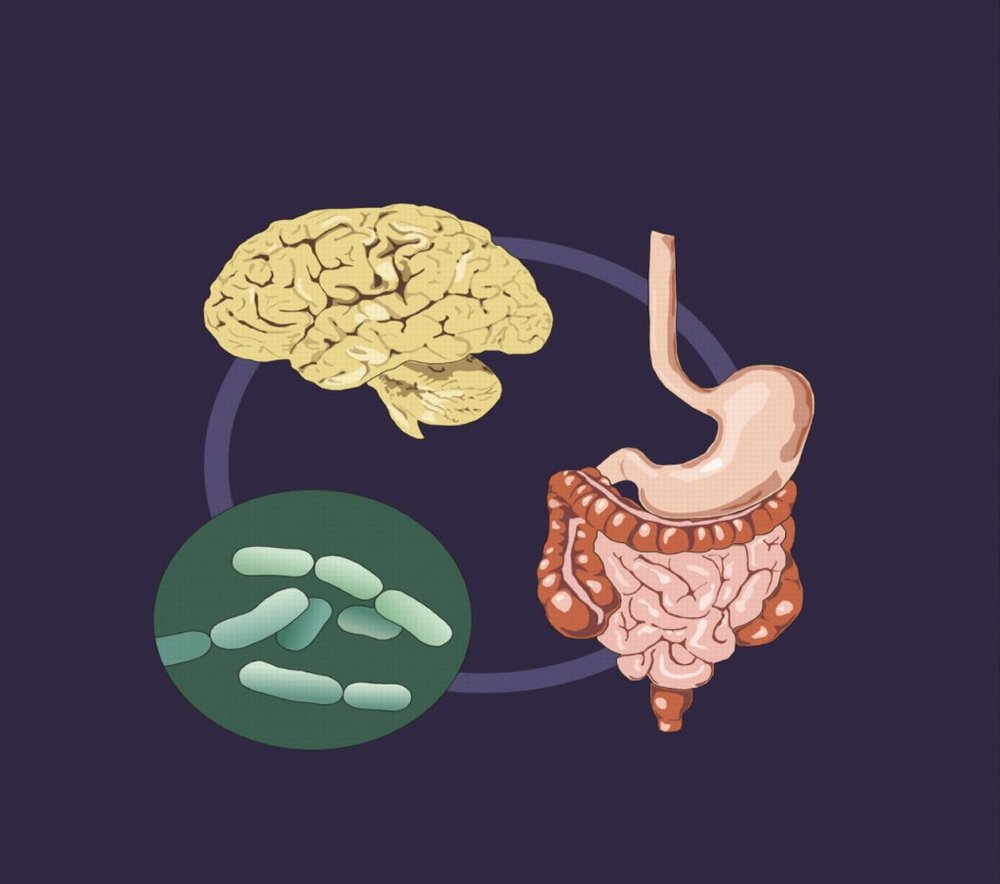
Researchers Find Surprising Link Between Gut Bacteria and Mental Health

Scientists have long declared that our gut does more than just digest food. The small bacteria found inside our intestines are affecting everything from weight maintenance and cravings to sleep and neurological health. It’s actually the gut microbiota, consisting of a number of good microorganisms living inside the gut, which are responsible for regulating digestion and metabolism, but recently, it was been discovered that these microbiotas are also linked to mental health conditions such as stress, depression and anxiety.
Can Your Gut ‘Talk’ to the Brain?

Recent studies have proved that there exists a strong link of communication between our gut and brain
The different kinds of bacteria inside your gut live in harmony as long as you stay healthy and follow a good diet. But your gut is in constant communication with the central nervous system as well through a two-way channel called the gut-brain axis. Through this axis, the brain is able to send and receive from the gut – and even the microbiota inside.
Researchers have conducted numerous experiments on animals to find out more about the strange gut-brain relationship and in one study conducted on mice, it was discovered that the introduction of good bacteria, such as the lactobacillus found in yogurt, when inside the gut led to lowered stress levels. Once the main channel of communication (a vagus nerve) between the gut and brain was cut off, the effect could no longer be observed. This proved that the brain does indeed communicate with the gut through the vagus nerve and is likely to be the reason why a healthy gut leads to better brain health.
Gut and Mental Health

An intriguing study, conducted recently, took gut microbiota from people with depression and transplanted them inside rats only to discover that the rats showed the same depressive behavior as the human participants
A few researches in the past have shown that people who suffer from depression or anxiety don’t have the same bacteria in their feces as their healthy counterparts. But doctors aren’t sure what causes this strange difference – in fact, it is even hard to say what counts as ‘healthy’ gut bacteria. What is really surprising is that the depressive symptoms caused by a change in gut bacteria can easily be transferred from one individual to another through fecal microbiota transplant.
Researchers have also found a two-way link between stress levels and gut health. It is no surprise that stress can often lead to serious mental illnesses and health conditions but now it has also been discovered to affect the microbiota living inside your gut. When rats were exposed to stress triggers, their gut microbiota changed instantly leading to a weaker response to stress. Foods containing probiotics were found to combat the problem and reduce stress-related behaviors in the mice.
Can Gut Health Affect Your Sleep?
Certain medical conditions such as the irritable bowel syndrome (IBS) can seriously affect your mood and researchers believe that it could have something to do the gut microbiota – no wonder IBS is called a gut-brain disorder which can often become worse with stress or anxiety. Almost 50 percent of the people who suffer from IBS show some signs of depression or anxiety due to unbalanced gut bacteria.
Since our sleep quality and timing is closely related to psychological well-being, it isn’t surprising to know that the effects of gut bacteria on stress and anxiety levels can also impact our sleep. Evidence from a study has shown that our circadian rhythm, which controls the daily sleep-wake cycle, is affected by gut microbiota. When bad bacteria were introduced inside the gut, female participants experienced lack of sleep and fatigue. However, these problems were not noticed in men who suffered from an unbalanced gut.
But the relationship between our circadian rhythm and gut health is bidirectional, which means that any changes in the biological clock brought about by an immune response can create an imbalance in gut microbiota, leading to sleep problems and stress. This change, however, can be controlled with a diet rich in probiotics and a steady sleep schedule which does not disrupt our body’s internal biological clock.
Many researches have proven a link between gut microbiota and mental health in animals, but very few experiments have been conducted on humans in this area of research. However, there is no doubt that a good diet, rich in fresh vegetables, fruits, fiber and lean meats, is key for healthy gut microbiota as well as prevention of various brain disorders, and it is only a matter of time that scientists discover a way to use microbiota in improving brain health and function.
More in Mental Health
-
`
Is Swimming in Cold Water Good for You?
Swimming is a beloved activity that provides numerous physical and mental health benefits. Swimming can be a fantastic workout, whether you’re...
November 15, 2023 -
`
Unlocking the True Benefits of Detox Water
Detox water has taken the health and wellness world by storm, promising a wide range of benefits that go beyond ordinary...
November 7, 2023 -
`
How Tom Brady Shed 10 lbs After Retirement
One of the NFL’s most celebrated athletes, Tom Brady, has always been a topic of discussion. Brady never fails to surprise,...
November 1, 2023 -
`
AI’s Hidden Toll on Our Brains
Artificial Intelligence (AI) has permeated almost every facet of our lives, from virtual assistants and recommendation algorithms to autonomous vehicles and...
October 24, 2023 -
`
What to Drink During a Workout
When it comes to getting the most out of your workout, proper hydration is key. What you drink during exercise can...
October 17, 2023 -
`
Wearable Technology Applications in Healthcare
The world of healthcare is evolving at an unprecedented pace, and wearable technology is one of the driving forces behind this...
October 10, 2023 -
`
Initiating and Integrating Exercise in Daily Life
Incorporating exercise into our daily lives is essential for maintaining optimal health and well-being. However, initiating a fitness routine and seamlessly...
October 10, 2023 -
`
Jason Momoa’s Workout Routine for Iconic Aquaman Look
We all remember the moment: The big screen lights up, waves crash, and out emerges Jason Momoa as Aquaman, with his...
October 8, 2023 -
`
Crying: The Benefits on Mental Health
In a world that often champions stoicism and emotional restraint, shedding tears is sometimes dismissed as a sign of vulnerability. However,...
September 26, 2023















You must be logged in to post a comment Login